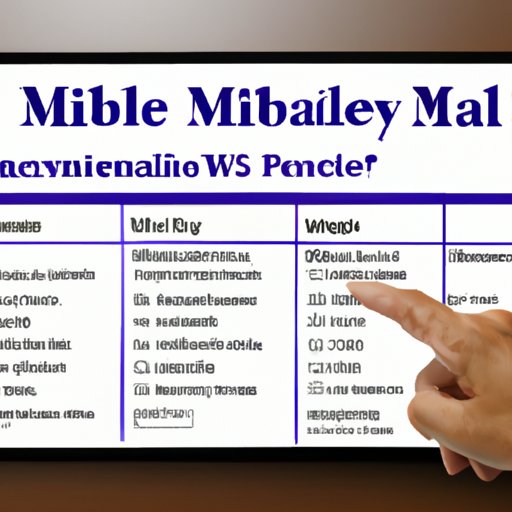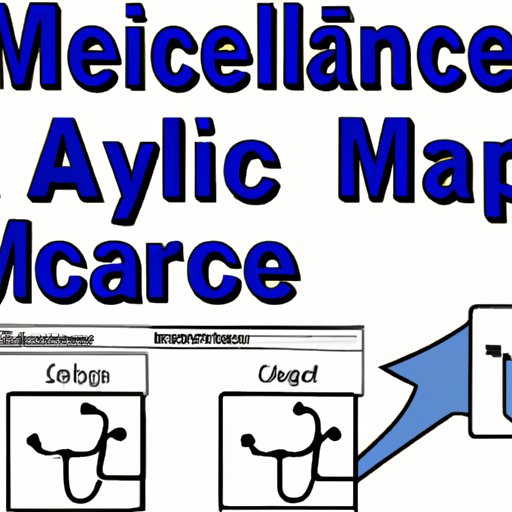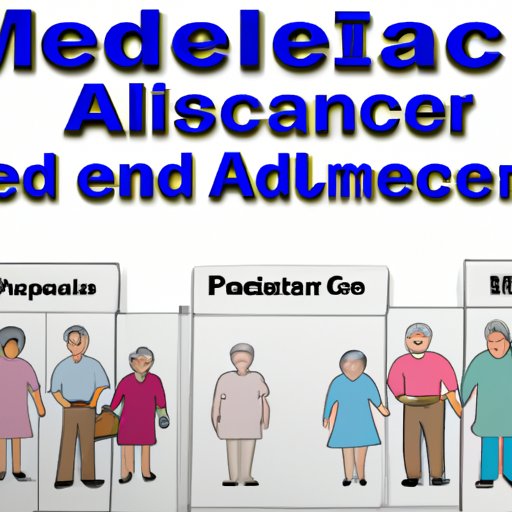Introduction
Medicare is a health insurance program administered by the federal government that provides coverage to eligible individuals who are aged 65 and over, or who have certain disabilities. Medicare helps elderly citizens access quality health care services and covers the cost of most medical expenses. This article will explore the benefits of Medicare for elderly people, how to determine eligibility, how to compare different plans, and the cost of Medicare.

Exploring the Benefits of Medicare for Elderly People
Medicare offers several important benefits to elderly people, including improved access to health care, financial support for medical expenses, and special programs and services.
Improved Access to Health Care
One of the primary benefits of Medicare for elderly people is improved access to health care. Most elderly individuals qualify for Medicare Part A, which covers hospital stays, skilled nursing facility care, hospice care, and some home health care. Medicare Part B covers doctor visits, preventive care, lab tests, and other outpatient services. With Medicare, elderly people can receive quality health care services without worrying about high out-of-pocket costs.
Financial Support for Medical Expenses
Another benefit of Medicare for elderly people is that it provides financial support for medical expenses. Medicare pays for most of the cost of covered services, so elderly people don’t have to worry about paying large amounts out of pocket. In addition, Medicare covers many preventive services at no cost to the beneficiary, such as cancer screenings, flu shots, and diabetes screenings.
Special Programs and Services
Medicare also offers several special programs and services for elderly people. For example, the Medicare Advantage program allows beneficiaries to choose a private health plan that is tailored to their specific needs. Medicare also offers prescription drug coverage through Part D, as well as vision and dental coverage through supplemental plans. These programs and services provide additional support to elderly people who may need extra help managing their health.

How to Determine Eligibility for Medicare
In order to be eligible for Medicare, an individual must meet certain criteria. The most common requirement is age; individuals must be 65 years old or older to qualify. In addition, they must be a U.S. citizen or permanent resident.
Age Requirements
The age requirement for Medicare is 65 years old or older. Individuals who are under the age of 65 can still qualify if they have been receiving Social Security disability benefits for 24 months or have end-stage renal disease (ESRD).
Income Requirements
Income requirements for Medicare vary depending on the type of coverage an individual is applying for. For example, those applying for Medicare Part A may have to show proof of income in order to qualify. In addition, individuals who are enrolled in a Medicare Advantage plan may have to meet specific income requirements set by the plan.
Other Factors
In addition to age and income requirements, there are other factors that can affect an individual’s eligibility for Medicare. For example, individuals must live in the United States and be a U.S. citizen or permanent resident. They must also not be incarcerated.
Comparing Different Medicare Plans
When considering Medicare coverage, it is important to understand the different types of plans available. The three main types of plans are Original Medicare, Medicare Advantage, and Medicare Supplement Plans.
Original Medicare
Original Medicare consists of Part A and Part B. Part A provides coverage for hospital visits and stays, as well as skilled nursing facility care and hospice care. Part B covers doctor visits, preventive care, lab tests, and other outpatient services. Original Medicare does not cover prescription drugs, but beneficiaries can purchase a separate Part D plan for this coverage.
Medicare Advantage
Medicare Advantage plans are offered by private insurers and provide an alternative to Original Medicare. These plans typically offer more extensive coverage than Original Medicare, including prescription drug coverage and sometimes vision and dental coverage. Medicare Advantage plans also often come with lower out-of-pocket costs than Original Medicare.
Medicare Supplement Plans
Medicare Supplement Plans, also known as Medigap plans, are designed to supplement Original Medicare. These plans provide additional coverage for costs that Original Medicare doesn’t cover, such as copayments and coinsurance. Medicare Supplement Plans do not include prescription drug coverage, so beneficiaries must purchase a separate Part D plan for this coverage.
Examining the Cost of Medicare for the Elderly
The cost of Medicare for elderly people depends on the type of coverage they have. There are generally three types of costs associated with Medicare coverage: coverage costs, out-of-pocket expenses, and additional sources of financial support.
Coverage Costs
The cost of Medicare coverage depends on the type of plan an individual has. For example, Original Medicare requires beneficiaries to pay a monthly premium for Part A coverage, while Part B has a higher premium. Medicare Advantage plans usually require a monthly premium, as well as copayments and coinsurance for services. Medicare Supplement Plans also require a premium, as well as copayments and coinsurance.
Out-of-Pocket Expenses
In addition to premiums, elderly people may also have to pay out-of-pocket expenses for their Medicare coverage. These expenses can include copayments and coinsurance for services, as well as deductibles and other costs. Out-of-pocket expenses vary depending on the type of plan an individual has.
Additional Sources of Financial Support
There are several sources of financial support available for elderly people who are struggling to pay for their Medicare coverage. These include Medicaid, the Low Income Subsidy (LIS) program, and state assistance programs. In addition, some employers offer retiree health plans that can help offset the cost of Medicare.
Understanding the Difference Between Medicare and Medicaid
Medicare and Medicaid are both government-funded health insurance programs, but there are some important differences between them. It is important to understand these differences in order to make the best decision about which program to enroll in.
Overview of Medicaid
Medicaid is a health insurance program for low-income individuals and families. It is funded jointly by the federal government and states, and it covers a wide range of medical services, including doctor visits, hospital stays, prescription drugs, and long-term care. Unlike Medicare, Medicaid is means-tested, meaning that eligibility is based on income and assets.
Differences in Eligibility Requirements
The eligibility requirements for Medicare and Medicaid are different. As mentioned above, Medicare is primarily based on age, while Medicaid is based on income and assets. In addition, Medicaid is only available to individuals and families with limited financial resources, while Medicare is available to all eligible individuals regardless of income.
Differences in Coverage and Cost
The coverage and cost of Medicare and Medicaid are also different. Medicare coverage is typically more comprehensive than Medicaid coverage, and Medicare beneficiaries generally have lower out-of-pocket costs. However, Medicaid may cover services that Medicare does not, such as long-term care and some dental services.

Navigating the Medicare System for Elderly Citizens
Navigating the Medicare system can be confusing for elderly citizens. It is important to understand the process and know when to apply for coverage, how to sign up for Medicare, and what rights and responsibilities come with being a Medicare beneficiary.
Knowing When to Apply
It is important to know when to apply for Medicare coverage. Generally, individuals should apply for Medicare three months before their 65th birthday. If they are already receiving Social Security benefits, they will be automatically enrolled in Medicare. Those who are not receiving Social Security benefits should contact their local Social Security office to apply.
Signing Up for Medicare
Once an individual has determined that they are eligible for Medicare, they can begin the enrollment process. To sign up for Medicare, they must fill out an application and submit it to the Social Security Administration. Once their application is approved, they will receive a Medicare card in the mail.
Understanding Your Rights and Responsibilities
It is important for elderly citizens to understand their rights and responsibilities as Medicare beneficiaries. This includes knowing what services are covered by Medicare, understanding their out-of-pocket costs, and familiarizing themselves with any appeals processes. In addition, it is important to understand the rules and regulations surrounding Medicare fraud and abuse.
Conclusion
Medicare is an important government-funded health insurance program that provides coverage to elderly citizens. It offers several important benefits, including improved access to health care, financial support for medical expenses, and special programs and services. It is important to understand the eligibility requirements, coverage options, and cost of Medicare in order to make the best decision about which plan is right for you.
(Note: Is this article not meeting your expectations? Do you have knowledge or insights to share? Unlock new opportunities and expand your reach by joining our authors team. Click Registration to join us and share your expertise with our readers.)
